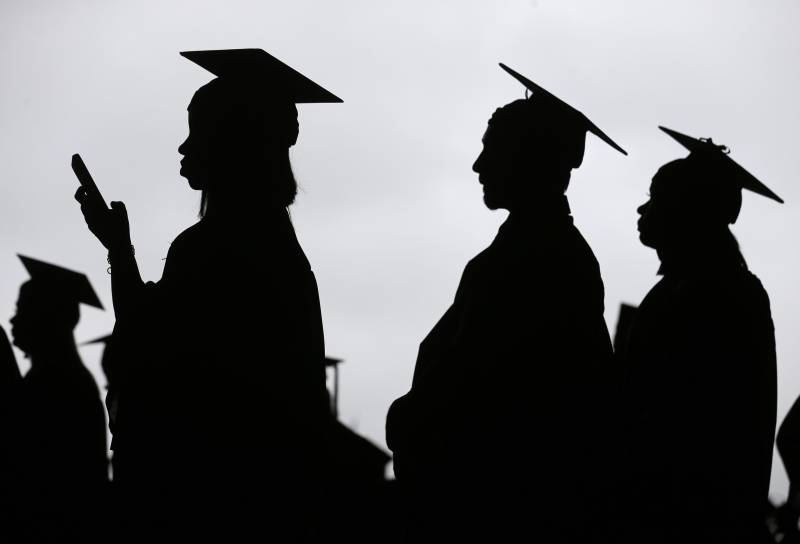
This story was originally published by Chalkbeat. Sign up for their newsletters at ckbe.at/newsletters.
On the campaign trail, Donald Trump pledged to get rid of the U.S. Department of Education, expand school choice, roll back new protections for LGBTQ students, and deport millions of undocumented immigrants.
Now that the former Republican president is headed to a second term, the question becomes how likely Trump is to act on his most extreme or implausible proposals and what effects students, teachers, and parents will see in the classroom.
Trump won a decisive victory, picking up nearly every swing state and gaining ground among young voters and voters of color who have been essential members of the Democratic coalition.
Chalkbeat spoke to advocates, experts, and former education department officials about what to expect from the next administration. They widely agreed that President Joe Biden’s Title IX rewrite, which extended new protections for transgender students and is currently tied up in the courts, will be repealed, that civil rights enforcement will look very different, and that future education budgets will be more austere.
But they disagreed on how likely it is that Trump would actually do away with the U.S. Department of Education and how much progress he might make toward federal support for school choice.
A lot will depend on who controls Congress. Votes are still being counted in key races, but Republicans will control the Senate. Control of the House remains unclear and may not be known for days. A trifecta could clear the way for a broader Trump agenda. If Democrats take control of the House, Trump would have to rely more on his executive authority. But even on some key conservative priorities, Republicans are not unanimous, and some may balk at proposals they see as expanding the federal role or disadvantaging their constituents.
Trump’s pick for education secretary — whether he opts for an experienced administrator or a dedicated culture warrior — will also shape his education agenda.
Calls to abolish the Department of Education have new momentum
Arguably this has been Trump’s most consistent promise on education policy but also the one that seems most far-fetched to some political observers. Conservatives have talked about getting rid of the department for almost as long as it’s existed, and Trump didn’t make any moves to dismantle it in his first administration.
Fully dismantling the department would require an act of Congress. But Trump could limit its reach in other ways, such as eliminating or moving programs, removing career bureaucrats, and proposing much tighter budgets.
But Jim Blew, who served in Trump’s education department in his first administration and went on to found the Defense of Freedom Institute, said Trump has been adamant that he wants to get rid of the department and that alone gives the idea more “heft.” Blew also believes public support for a federal role in education is changing. Many people don’t think the federal investment in COVID recovery yielded much, he said. At the same time, people see initiatives such as student loan forgiveness and protections for transgender students as examples of federal overreach.
It would take months to take the department apart, Blew said, because every function mandated by Congress would need a new home. But that could be done, he said. Civil rights enforcement could move to the U.S. Department of Justice, for example, and Title I funding for high-poverty schools could become a block grant administered by the U.S. Department of Human Services.
Trump has been clear that his priorities are economic recovery, immigration, and national defense, Blew said, but that doesn’t mean he won’t follow through on education promises.
“It doesn’t need a lot of attention,” Blew said. “It needs political capital. And he can expend that while remaining focused on other priorities.”
Immigration enforcement could ripple through school communities
Trump made demonization of immigrants the centerpiece of his campaign, highlighting at every turn examples of crimes committed by undocumented immigrants or asylum seekers and the impact of immigration on American communities and schools.
Trump has promised to carry out the largest deportation operation in American history. Some experts on immigration policy have said such an effort would be legally and logistically challenging, as well as very expensive. Nonetheless, most observers expect to see an increase in enforcement.
Previous workplace raids have had widespread impacts on students whose parents were arrested, as well as on the broader community. An estimated 4.4 million American children have at least one undocumented parent, and some former Trump immigration officials have suggested that families be deported together.
Mike Petrilli, president of the conservative education advocacy organization The Fordham Institute, believes Trump’s education policies won’t make much difference in American classrooms, but his immigration policy may be felt in dramatic ways.
“It’s what he’s campaigned on, it’s what he’s promised to do, and he’d have a pretty free hand to do it,” said Petrilli, who has argued that American schools have a moral obligation as well as a legal one to educate all children who live here.
“The chances that it’s a humanitarian disaster are quite high,” Petrilli said. “Is he going to put people in camps? Will that include families? Are there going to be schools in these camps? I don’t see any reason we should believe they won’t give that a try.”
Even if enforcement is spotty, changes to federal policy have the potential to sow confusion and chaos in local communities, said Janelle Scott, a professor at University of California Berkeley. Some families may keep children home from school out of fear, she said. The messages that local law enforcement and school district officials send to families in this situation could make a difference.
Transgender students could lose new protections as civil rights enforcement changes
When the Biden administration issued new Title IX rules that clarified and strengthened protections for transgender students, Republican states and conservative groups, including Blew’s Defense of Freedom Institute, quickly filed lawsuits that led to the rules being blocked in a majority of states.
Conservatives argued that the new rules eroded protections for cisgender girls because they might have to share bathrooms and locker rooms with transgender classmates and affected the free speech rights of teachers who might be forced to use pronouns and names they disagreed with. They also argued the Biden administration overstepped by defining discrimination on the basis of gender identity as a form of sex discrimination.
Trump is expected to rescind the Biden rules, a move that would still require a lengthy bureaucratic process. But some observers have larger fears for a Trump administration. He has repeatedly accused schools of performing gender surgeries without parental permission — a false and baseless claim — and attacked the idea of gender-affirming care for youth, as well as participation in sports by transgender athletes.
“There have been fantastical claims, but undergirding that is a deep hostility to queer kids as well as allegations that schools are engaging in child abuse if they protect the rights of queer kids,” said Scott, the UC Berkeley professor.
Trump’s first administration also revoked Obama-era guidance on school discipline that aimed to reduce suspensions and expulsions for students of color and emphasized quick resolution of complaints. Some conservative groups have also used civil rights complaints to go after programs that aim to support Black student excellence or mentor teachers of color.
Rick Hess, a senior fellow at the conservative American Enterprise Institute, said a Trump education department or justice department could make high-profile examples of a few school districts’ diversity initiatives and bring about more widespread change, similar to how the Obama administration targeted districts over school discipline.
School choice gets a modest momentum boost
Expanding taxpayer funding for private schools and home-schooling have topped the conservative education agenda in recent years. A proposed federal tax credit scholarship program backed by Trump’s first education secretary, Betsy DeVos, failed to get any traction. But during Biden’s presidency, Republican-led states have expanded or started private school choice programs, some of which offer money to nearly all interested families.
On Fox News, Trump promised to sign school choice legislation that passed a House committee, and at a barbershop in the Bronx, he talked about the importance of school choice.
Blew expects Trump to push for a tax credit scholarship proposal similar to the one drafted during his first presidency.
Petrilli isn’t convinced that Trump cares that much. “It’s a stretch to say that he’s made it a priority on the campaign trail,” he said. “He has to be reminded to talk about it.”
Petrilli is also not convinced there would be enough support even in a Republican-controlled Congress to send a bill to Trump’s desk. Some rural Republicans, whose constituents have few private school options, are skeptical. So are small government conservatives who don’t want to expand federal programs.
Voters in three states — including two that Trump won by large margins — rejected school choice at the ballot on Tuesday, indicating that even many conservatives have qualms about spending public money on private schools.
But Congress will have to reauthorize Trump’s tax cuts, and a tax credit that allows businesses and individuals to write off donations to private school scholarships could be included there. Observers also expect to see a push to allow families to use money in tax-favored 529 accounts to pay for homeschooling expenses, tutoring, and other educational needs. That money already can be used for private school tuition.
This is a developing story and will be updated.
Chalkbeat is a nonprofit news site covering educational change in public schools.
Related:
The purpose of a K-12 education: Who decides and how do we get there?
Learn how to modernize your K-12 financial operations
For more on education policy, visit eSN’s Educational Leadership hub
On the campaign trail, Donald Trump pledged to get rid of the U.S. Department of Education, expand school choice, roll back new protections for LGBTQ students, and deport millions of undocumented immigrants. Education Policy & Funding, Educational Leadership, Featured on eSchool News, choice, Department of Education, Education, school, school choice, schools, story, students, U.S. Department of Education, up eSchool News







